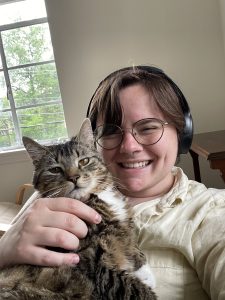What is the MADS partnership and how did it start?

MADS, which stands for Metadata and Discovery Strategy, is a department that works in Collection Services in Smith, Bay 10. I work in the LSC (Library Service Center) as a Senior Library Assistant, where I’ve been for a little over a year. In the LSC, which is off campus, it can be a bit difficult to work with librarians a lot. We’re an offsite storage facility and we don’t see many of them. Dracine Hodges, who is the Associate University Librarian for Collections Services, and Jacquie Samples, who is the MADS department head, developed the idea of the workflow partnership. They worked with the LSC manager, Marvin Tillman, and the Associate University Librarian and Director of Financial and Facility Services, Jameca Dupree, to begin a workflow partnership that would help both the LSC and the MADS department.
As an employee at the LSC, I go over to Smith once a week. I work closely with the MADS team, particularly Jacquie Samples and Heather Baker, on record cleanup, checking records in CaiaSoft and Alma research/implementation. It’s good for our departments to work together because, over at the LSC, we do have a lot of experience in CaiaSoft. It’s also helpful for me because I’ve learned a lot about Aleph and Alma, the new software that DUL is migrating to. A full migration occurs in the summer of 2024. I have also been Alma certified and take notes/knowledge learned about Alma to my LSC coworkers. It’s been a mutually beneficial partnership as we continue to do record cleanup and transition to Alma.
How has MADS helped you become better in your position?
I’ve certainly become more knowledgeable during my time in MADS. I’m not accustomed to working in Aleph Cataloging and I had no knowledge concerning Alma. It was good to be on this team that directly works in Alma. It has helped to keep me on track as we continue the transition. I’ve also learned about several jobs that are completed by the MADS team in software that I didn’t have much experience in, so I’m getting to learn something else that is newer territory. I’ve also worked on record cleanup, assigned remote storage IDs and looked at collection codes, all in Aleph Cataloging. During my time here, I’ve also become more comfortable working with people outside of the LSC in CaiaSoft and I’ve really accepted my role and become more confident in explaining the software and being able to confidently answer questions. Being offsite in the LSC made me feel a bit distant from the other libraries, so constantly corresponding with these librarians has been extremely beneficial for me. I’ve also learned a lot about Alma. I feel more prepared for the migration than I would’ve had this workflow partnership never happened.
What were your challenges and what did you feel most confident about going into this workflow partnership?
I would say that I felt confident about everything that I have worked on in the LSC. This includes all our CaiaSoft functions. I had already met Jacquie and we had an informative conversation, so I felt comfortable because I use CaiaSoft every day. I felt comfortable being able to answer CaiaSoft questions or check items in CaiaSoft and look for item reports. I also felt comfortable in Aleph Circulation as these are both software that are used daily in the LSC.
My biggest challenge was that I don’t work on the same jobs that the MADS team works on. I also didn’t have the same knowledge. They work with Metadata. MARC fields and the terminology are different, so I felt a bit out of the loop. They are, of course, also very knowledgeable in Alma and I was really starting out so I didn’t feel as if I could contribute very much. I now believe that it has become mutually beneficial because I’m learning that our workflow connects both of our software and examines the relationship between them. We can both answer each other’s questions. They were also extremely nice when it came to pacing and stopping to explain things or answer any questions that I may have.
What have you enjoyed the most about this workflow partnership?
For me, it’s a great learning experience. I’ve learned a lot about other software that I’ve become more accustomed to using. I’ve been able to learn a lot about what they do in Metadata. I’ve gotten to work on the other side of Aleph that I never worked in before. As a librarian, it’s good to have knowledge of software, even if you don’t constantly use it. I’m confident that this knowledge will be beneficial as I move forward in my career. I also believe that it has helped me with professional communication skills. As for the LSC, it can be a challenge to uphold communication with other librarians at Duke. We don’t come into contact with them that often so coming to Smith has strengthened that communication and it broadens my interests as well.
What do you hope to achieve going forward?
I hope to learn as much as I possibly can. I’d like to be a well-rounded librarian. It’s important to take the time to work with other groups of people and learn their perspectives. I hope to continue working with the MADS group as well as other groups and librarians around Duke, and even outside of Duke. It’s been a great learning and networking experience. It will help me continue to grow and learn as a librarian. I also hope that my interest and knowledge continue to broaden, and more workflow opportunities are available for me in the future.
As for this MADS group, I hope to continue working with them, even after the implementation of Alma. I hope to be able to continue communicating with them and that this partnership opens up more opportunities here at Duke where I get to work with more people.




 Corrina has been working at Duke since 1988! She started in the Medical Center, and transferred to the Surgical Private Diagnostic Clinic (later called the Private Diagnostic Clinics) in 1990. Corrina joined Duke Libraries in 1994, spending all of that time working with the Bindery, with several changes, location moves, and position upgrades along the way! One of Corrina’s favorite Duke memories is attending the DUL staff appreciation lunches (especially at the Searle Center), and getting to use work time to attend them. (Way back when, those lunches included humorous plays put on by library staff!)
Corrina has been working at Duke since 1988! She started in the Medical Center, and transferred to the Surgical Private Diagnostic Clinic (later called the Private Diagnostic Clinics) in 1990. Corrina joined Duke Libraries in 1994, spending all of that time working with the Bindery, with several changes, location moves, and position upgrades along the way! One of Corrina’s favorite Duke memories is attending the DUL staff appreciation lunches (especially at the Searle Center), and getting to use work time to attend them. (Way back when, those lunches included humorous plays put on by library staff!) Lesley has worked at Duke since 2001 (all of it in Duke Libraries), first in Receipts Management (starting as Library Assistant and later as Section Head) within the Acquisitions Department, and then in the Cataloging Department (now called Resource Description). Later, she joined Shelf Preparation Section, before becoming part of the BAMM team. One of Lesley’s favorite Duke memories is attending the
Lesley has worked at Duke since 2001 (all of it in Duke Libraries), first in Receipts Management (starting as Library Assistant and later as Section Head) within the Acquisitions Department, and then in the Cataloging Department (now called Resource Description). Later, she joined Shelf Preparation Section, before becoming part of the BAMM team. One of Lesley’s favorite Duke memories is attending the 


